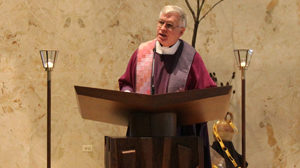Scripture:
Reflection:
This little periscope from Mark’s Gospel could very well be called a “Treatise on Happiness and Joy.” Jesus is being challenged by the disciples of John the Baptist as well as by the Pharisees. The thinking behind the challenges is that there are three great acts of religion. #1. Prayer, #2. Fasting, and #3. Alms Giving. The disciples of JB and the Pharisees knew there was only one day that required fasting. This was the Day of Atonement. However, the Pharisees also fasted two days a week, Mondays and Wednesdays.
Jesus informs the questioners that as long as the Bridegroom was present, there was no call for fasting, but only celebration, happiness, and joy. In the time of Jesus a wedding celebration could last a whole week. During this period the bridal party and the guests continue the celebration and sharing in the joy of the newly married couple. So too, for Jesus’ disciples, as long as Jesus was present, it was time to celebrate.
This scripture passage is one of the resources that establishes in Christian Spirituality the axiom that an infallible sign of the presence of God in one’s life is the presence of “joy” and “happiness.” The word “joy” is uses fifty-five times in the New Testament. Derivations of the word “joy” such as “joyful, Joyously” are used at least fifty times! The other axiom in Christian Spirituality that assures one of the presence of God in one’s life is a deep sense of “peace.” This word is used 393 times in the New Testament. If one wants to understand if they are close to God all one has to do is ask “Am I a person of Joy and Peace?”
Happiness happens to us when we rejoice in the truth. The Absolute Truth is itself the Light of God. The Celts say that life is a journey to Truth. When someone passes on, the Celts will say: “Now he/she knows the Truth.” This journey compels us to “love people and use things.” It takes courage to repudiate pride and it takes strength to love others, family, friends, and the Ultimate Other, God.
In recent years, people have taken this message to heart and have developed a spirituality which could be called the “The Mysticism of the Face,” others have called it “The Mysticism of the Eyes,” and still others have called it the “Mysticism of the Other.” The ultimate Other is God. The atrocities of the past century would not have happened if we all looked each other in the eyes, in the face, and again saw them as a reflection of “The Other” i.e. God.
Fr. Ken O’Malley, C.P., is the formation director and local superior at Holy Name Passionist Community in Houston, Texas.
